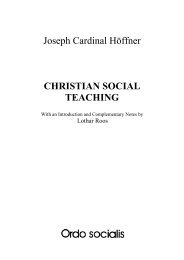Prof. Franz Josef Stegmann Bethlehem Social ... - Ordo Socialis
Prof. Franz Josef Stegmann Bethlehem Social ... - Ordo Socialis
Prof. Franz Josef Stegmann Bethlehem Social ... - Ordo Socialis
You also want an ePaper? Increase the reach of your titles
YUMPU automatically turns print PDFs into web optimized ePapers that Google loves.
<strong>Stegmann</strong><br />
ministry, Alfred Müller-Armack, put the theory of <strong>Social</strong> Market Economy into political and<br />
economic practice.<br />
1.1 Competition of achievement and efficiency<br />
The neoliberal "fathers" understood by <strong>Social</strong> Market Economy, an economic system combining<br />
"the principle of freedom in the market with the principle of social justice". The concept is<br />
based on the conviction that competition is "an indispensable tool for organising modern mass<br />
societies", but that this competition "only works if it is safeguarded by a clean framework and<br />
strong legal regulations". 37 The central core of <strong>Social</strong> Market Economy is "competition based<br />
on achievements of output and efficiency" (Leistungswettbewerb). Since real competition<br />
does not automatically result from the free play of forces - as history and modern economics<br />
teach - the state policy has the responsibility to enable, establish and promote competition. as<br />
well as to safeguard it from restrictions by powerful individuals or collective amalgamations.<br />
Legislators and government must therefore create "the legal framework for every economic<br />
activity, business, trade and industry" 38 (den rechtlichen Ordnungsrahmen für das wirtschaftliche<br />
Geschehen im weitesten Sinn); this framework "has to prevent restrictions of free<br />
competition as much as possible and. at the same time, control unavoidable monopolies and<br />
cartels in order to make competition work most effectively for the consumers' interest, advantage<br />
and benefit". 39<br />
1.2 <strong>Social</strong> conditions and elements<br />
Added to the "competition of achievements” are equally important social conditions, rules and<br />
social objectives that need to be met and which form the so-called "second pillar" of <strong>Social</strong><br />
Market Economy. These social elements were considered by the neoliberal founders of the<br />
<strong>Social</strong> Market Economy to be on four levels:<br />
• The alignment of industry and commerce with the needs and wishes of the consumers (by<br />
the play of supply and demand) and not with a central state authority as it was during the<br />
war and post-war periods.<br />
• An income distribution tied to individual performance and achievements and in this sense<br />
"a just income distribution". 40<br />
• A continual improvement in economic production due to the constant pressure of competition.<br />
• Owing to rising productivity, the increasing ability of the state to compensate for socially<br />
negative results and to facilitate necessary changes to economic structures.<br />
During the war and post-war periods in Germany, the economy was planned and controlled by<br />
a central state authority. Individual consumers were not allowed to buy as much as. or cxactly<br />
what, they wanted. The government prescribed, for example, how much bread and butter per<br />
month, and how many coats and pairs of shoes per year, each person was entitled to buy.<br />
Against the background of this centrally planned economy, the alignment of economic<br />
activity to the needs and wishes of the consumers appeared in itself already to be a social<br />
achievement. It is certainly true that the wishes of consumers can be manipulated by<br />
37<br />
Alfred Müller‐Armack, Soziale Marktwirtschaft. in: Handwörterbuch der Sozialwissenschaften. Vol. 9.<br />
Stuttgart 1956. 390‐392. 390.<br />
38<br />
Was ist Soziale Marktwirtschaft? Aktionsprogramm der Aktionsgemeinschaft Soziale Marktwirtschaft. in: Das<br />
christliche Gewissen und die soziale Marktwirtschaft des Neoliberalismus, offprint from Junge Wirtschaft. No.<br />
2/ Februars 1960. 7.<br />
39<br />
Müller‐Armack, Soziale Marktwirtschaft. 391 (see note 2).<br />
40<br />
Ludwig Erhard, Das Problem der freien Marktwirtschaft, in: Vierteljahreshefte zur Wirtschaftsordnung, 1949,<br />
71‐87, 78.<br />
21















